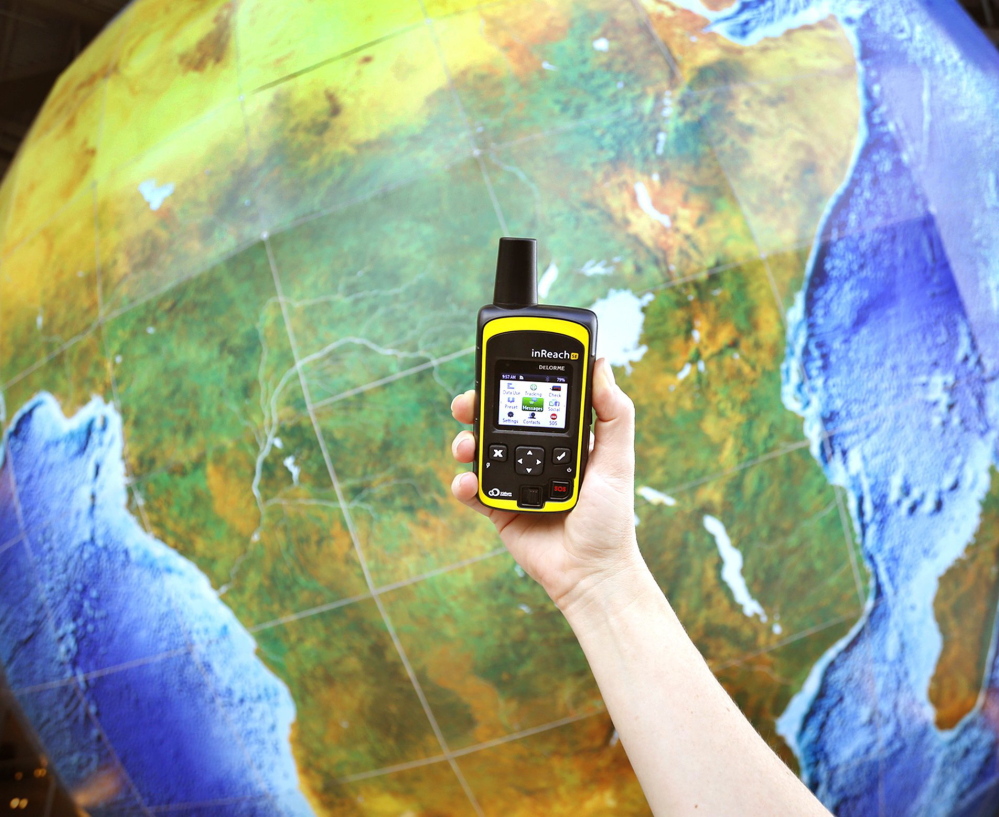A federal trade judge has recommended that DeLorme, the mapping company known for its Maine Atlas and Gazetteer, pay a civil penalty for inducing infringement on the patent of another company.
At issue is DeLorme’s series of hand-held, satellite-enabled communication devices, marketed under the brand name InReach, which are able to send text messages from anywhere in the world regardless of cellphone reception. BriarTek, of Virginia, alleges that DeLorme’s InReach products infringe on its patent for a similar satellite-enabled product.
An administrative law judge with the International Trade Commission on March 7 issued a brief decision saying DeLorme’s importing of components used in its InReach devices does not “directly infringe” on BriarTek’s patent, but that the sale of certain products that include those components “induces the infringement” on the patent. The judge, Dee Lord, released only her conclusions on March 7. A full ruling will not be publicly released until both parties have a chance to submit redacted versions.
In light of the finding, Lord recommended DeLorme pay a civil penalty of $637,500. The amount is much less than the $100,000 per day that BriarTek requested in its complaint.
DeLorme will appeal the decision this week, according to Peter Brann, DeLorme’s attorney. Kim Stiver, DeLorme’s vice president for marketing, did not respond to requests for comment on Monday.
Brann on Monday called the judge’s finding “absurd on its face.”
The judge “agreed with us on most everything except on this one issue, and on this one issue we think she got it completely wrong,” Brann said. “Having induced infringement without direct infringement is like staging ‘Hamlet’ without the prince.”
Brann said this is the first time DeLorme has been accused of patent infringement, and that BriarTek’s intention is “to use the cost and threat of this (legal) process in order to harm DeLorme or force them to (buy) a license.”
John Fuisz, BriarTek’s lawyer, wrote in an email that he was happy with the judge’s decision. He implied the ruling is more complex than the judge’s conclusions make it seem, though he wouldn’t go into detail until the full ruling is publicly released.
“Direct infringement of the consent order focused on the state of the goods as they passed the border,” he wrote. “It was not a finding that there was no direct infringement in a traditional sense. I have to wait for that to be public, but we are VERY happy.”
BriarTek first filed its complaint against DeLorme with the International Trade Commission, which has jurisdiction over international trade matters, in August 2012, when DeLorme was manufacturing its InReach products overseas and importing them to the United States.
The company accused DeLorme of infringing on a U.S. patent it received in 2011 for a “global biodirectional locator beacon and emergency communications system,” essentially an emergency monitoring system that includes a unit such as an InReach device and the ability to communicate with a satellite system.
The trade commission agreed to investigate, but dropped the investigation in April 2013 after DeLorme began manufacturing the InReach products at its facility in Yarmouth and signed a consent agreement, which did not include an admission of guilt, promising not to “import into the United States, sell for importation into the United States, or sell or offer for sale within the United States after importation any two-way global satellite communication devices, system, and components” that infringe on BriarTek’s patent.
But days after the commission dropped the investigation, BriarTek filed another complaint alleging that the third-party resale of DeLorme’s InReach products; the overseas manufacture of components used in InReach products, such as transceivers by Iridium Satellite Inc.; and the activation of InReach devices by end users violated the consent agreement.
DeLorme filed a complaint in federal court in May 2013 seeking a judgment that it has not infringed on BriarTek’s patent and, further, that BriarTek’s patent is invalid in the first place. In the complaint, DeLorme’s lawyers claim BriarTek’s own satellite emergency communications device, marketed as CerberLink, can’t compete with DeLorme’s InReach devices and that BriarTek is using the legal wrangling and claims of patent infringement as “an improper attempt to shut down its lower-priced competition.” That case is still pending.
Joe Landa, a co-founder of BriarTek, said Monday that he was pleased with the trade commission judge’s decision, but directed legal questions to Fuisz. When asked if the two companies have a prior history of litigation, Landa declined to comment.
“I’m not comfortable commenting on the history between the companies or conversations the companies have had,” he said.
Brann said DeLorme will appeal the decision to the full International Trade Commission, which will have until June to make a decision. If the commission upholds the judge’s decision, DeLorme will appeal in federal court, Brann said.
“We have every expectation we will overturn it in its entirety,” he said.
Whit Richardson can be contacted at 791-6463 or at:wrichardson@pressherald.com
Send questions/comments to the editors.


